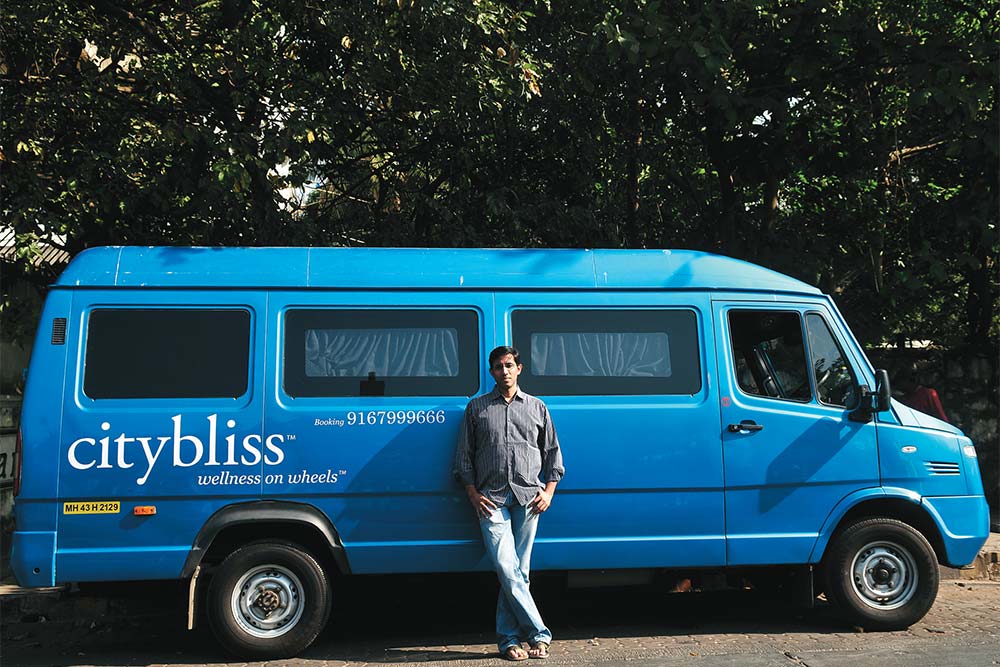It was 2010. Swadeep Patil stretched his legs at the Hyderabad airport with a long sigh. He had been hunched over his notebook computer for hours. His neck was stiff, his back hurt, his very bones ached. He had a two-hour flight to Mumbai followed by your everyday traffic snarls before he could think about relaxing a bit. He desperately wanted to unwind. He would have paid an arm and a leg (all pains included) for a good foot massage but where was he going to find a spa — a quick web search confirmed there wasn’t even one nearby — and the time to enjoy it? What if an affordable spa materialised on call? It was a tantalising daydream that morphed, well, into a vague business concept.
“Initially, I wondered if I could start a spa of sorts at airports but that was an expensive proposition,” recalls the 32-year-old Kerala-born engineer. “I wanted to enter the goods and services industry since my days at Yale. I was sure there was an idea there somewhere.”
Patil bought a vanity van, put in it a few modcons and CityBliss, the Mumbai-based spa-on-wheels, was set rolling. But why choose a van? “The math was simple,” reveals Patil, a consultant for Tata Consultancy Services back when he had his ooh-ah-ouch moment, in a manner of speaking. “The [van’s] diesel cost per month is lower than renting space in south Mumbai.”
Ice cream truck for adults
Patil and his friends pooled in $100,000 to get started in March 2010. They offered a relaxing spa experience for stressed-out corporate executives as they shuttled between meetings or headed home after work. A few trial runs later, CityBliss was formalised and registered. Patil started by targeting regular spa-goers with six basic services — foot, face and head massages, facials, pedicures and manicures. There was no budget for marketing, but word got around and local media was not far behind. Customers got curious and money started flowing in. “Airport transfers weren’t really part of the storyboard,” says Patil, but corporate customers now use the CityBliss van before and after a flight.
Each personalised service, all fully-clothed and requiring only the removal of footwear, takes 30-60 minutes and costs between ₹900 and ₹3,000. And drowning the din of traffic are the soothing sounds of the ocean that are piped in. Also, the drivers are trained to provide a smooth and timely ride. Apart from the odd pothole that defies wheeled luxury, guests do not feel like they are in a van at all.
Primary spa-goers still bring in 70% of revenue but customers are also gifting, a regular source of income he hadn’t anticipated, Patil adds. There are now more calls inquiring about the details of gifting than self-using customers. The average gift, Patil says, is worth ₹2,500 and is valid for a year. “Women gift a neck rub to their husband and come in for a foot massage as well,” he says of the typical gifting behaviour.
CityBliss is expanding slowly. Another therapist has joined the existing two servicing around 10 people a day. While business was slow in the beginning, the demand now gets overwhelming at four in the evening — the peak travel time. There has been a 15% increase in footfalls over the last six months and although he is cagey about his revenue figures, Patil says he has broken even and revenue has risen 15% in the last six months. To improve his margins, Patil has also hiked his prices by 10% and remains confident that his customers will keep coming back.
Tough spots
The business hasn’t been without its speed bumps and diversions. When CityBliss was registered, Patil had to painstakingly explain his idea to the traffic police department. Mumbai’s infamous ‘massage parlours’ didn’t help. “It was difficult convincing customers that we are a genuine spa,” Patil says with a laugh. “Others were looking for a more elaborate spa experience like a certain gentleman who wanted to take his shirt off.”
The more serious problem is that of expansion. “The biggest issue,” Patil says, “is the dead miles the van travels between customers.” To cut them down, Patil wants to add 16 vans to his fleet in the next two years. They will function in the suburban Mumbai clusters he calls micromarkets — locations based on his inventory of customer requests. Therefore, the expanded fleet’s seven locations will be south Mumbai, Worli-Mahim, Bandra-Juhu, Andheri-Goregaon, the entire stretch of the Western Express Highway, Matunga-Chembur-Ghatkopar, and Powai-Thane.
More vans will need more money but, currently, every extra hire is coming at the cost of Patil’s salary. “We are looking for debt funding but in the current climate, everything is difficult,” he rues.
He has sent feelers to the right people via TiE, the entrepreneurial group of which he is a member, and they have recommended he approach banks for debt. But Patil is tentative about borrowing in the present climate. There is also the unfortunate tag of a massage parlour that he has to shed off. “Banks fund spas, we have to show them a good business model,” he says.
But worries are the last thing on the minds of his customers as they cruise in sound-proofed comfort, reclining on plush seats while soft-spoken therapists attend to their feet with a peppermint rock salt. The city, then, is bliss.











